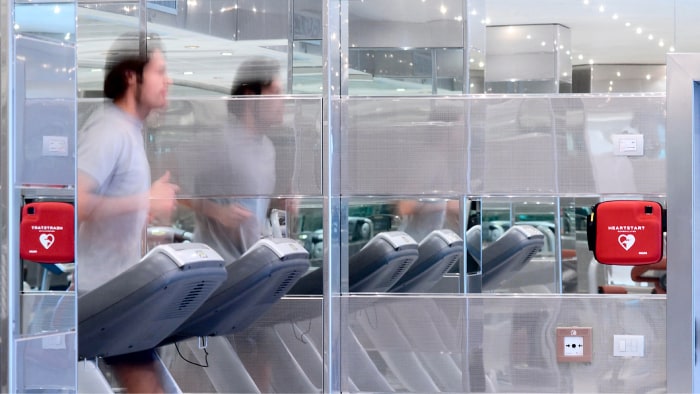Nov 08, 2023
Philips 2023 Where Is Your AED Survey: Further findings reveal that Australia’s workforce is significantly underprepared for out-of-hospital cardiac arrest cases
• Out-of-hospital cardiac arrest is a prevalent global health concern with 90% of patients not surviving, and most dying before reaching a hospital.[1] Approximately 20,000 Australians suffer an out-of-hospital cardiac arrest (OHCA) each year. • Raising awareness of AED locations is vital to ensure more Australians are prepared for when a sudden cardiac arrest could strike
• Three in five (58%) Australian workers unaware of the location of the AED nearest their workplace, despite one in five (18%) full time workers in Australia having been in a situation where they, or someone they know, has had to use an AED
SYDNEY, AUSTRALIA – Royal Philips (NYSE: PHG, AEX: PHIA), a global leader in health technology, today released further results of its 2023 Where Is Your AED Survey, with findings indicating that less than two-thirds of the Australian workforce is aware of the location of their closest AED (automated external defibrillator) to their workplace. • More than half the nation (52%) is unaware as to whether their workplaces are equipped with an AED; among those who are aware, 11% have no idea of its whereabouts. • Approximately one in two (48%) report their workplace does not have an AED; 53% for full-time workers.
New data, released at the close of ‘Shocktober’, the annual awareness month designed to drive awareness of the importance of learning CPR and how to use an AED, and National Work Safety Month, has also found that:
Conducted across 1,000 non-healthcare professional respondents nationally across Australia, initial findings, announced on World Restart a Heart Day on 16 October, revealed a significant gap between awareness and preparedness: while most Australians are aware of the potential of AEDs to save lives, most are unaware of where their nearest AED is located. Almost three quarters of Australians are unaware of nearby AED locations, despite over 9 in 10 (95%) Australians believing access to AEDs nearby is important to them.
The new data also showed that one in five (18%) full time workers in Australia have been in a situation where they, or someone they know has had to use an AED. This is concerning, given that the latest Transport Opinion Survey conducted by the University of Sydney’s Institute of Transport and Logistics Studies showed an increasing number of Australians favour working from the office rather than at home, with Australian workers on average spending 21% of their work week at home. About 42% of employers have stipulated that workers must return to the office for a set number of days during a week.
Unsurprisingly, approximately 97% of Australians believe there should be increased clear signage to inform people about AED locations in public spaces, and 97% of Australians believe there should be more public awareness campaigns to inform people about AED locations in public spaces.
There is still more action that needs to be taken across the country to help save lives. Approximately 20,000 Australians suffer an out-of-hospital cardiac arrest (OHCA) each year – nearly 20 times the annual fatal road toll. [2]”
“Education is one thing, but people knowing where to find their closest AED is another altogether. Amidst growing industry, government and academic recognition that having AEDs at workplaces play a key role in reducing OHCA deaths, this is a wake up call for more workplaces to improve workplace safety by ensuring clear and easy access to an AED to ensure rapid response in emergencies. We need to drive awareness at all levels to ensure AEDs are easily visible and their locations are known to those regularly in the immediate surroundings.”
Greg Page
Founder and CEO, Heart of The Nation
As a worldwide leader in AED solutions, we believe access to lifesaving support should always be just steps away and easy to use –in the workplace, at home or in public spaces, giving both professionals and non-professionals the confidence to quickly respond to a cardiac emergency at any time.”
Matt Moran
Managing Director, Philips Australia and New Zealand
Out-of-hospital cardiac arrest is a prevalent global health concern with 90% of patients not surviving, and most dying, before reaching a hospital; raising awareness is vital to ensure more Australians are prepared for when a cardiac arrest could strike. [1] Other relevant findings include: o New South Wales 43% o Victoria 45% o Queensland 40% o South Australia 33% o Western Australia 39% o New South Wales 16% o Victoria 16% o Queensland 18% o South Australia 10% o Western Australia 13% o New South Wales 56% (significantly lower than the other states) o Victoria 64% o Queensland 65% o South Australia 68% o Western Australia 68% o New South Wales 98% o Victoria 97% o Queensland 97% o South Australia 97% o Western Australia 99% NOTES TO EDITORS: References [1] Grasner JT, Lefering R, Koster RW, Masterson S, Bottiger BW, Herlitz J, et al. EuReCa ONE-27 nations, ONE Europe, ONE registry: a prospective one-month analysis of out-of-hospital cardiac arrest outcomes in 27 countries in Europe. Resuscitation. (2016) 105:188–95. doi: 10.1016/j.resuscitation.2016.06.004; Berdowski J, Berg RA, Tijssen JG, Koster RW. Global incidences of out-of-hospital cardiac arrest and survival rates: systematic review of 67 prospective studies. Resuscitation. (2010) 81(11):1479–87. doi: 10.1016/j.resuscitation.2010.08.006; Virani SS, Alonso A, Aparicio HJ, Benjamin EJ, Bittencourt MS, Callaway CW, et al. heart disease and stroke statistics-2021 update: a report from the American Heart Association. Circulation. (2021) 143(8):e254–743. doi: 10.1161/CIR.0000000000000950; Bray J, Howell S, Ball S, Doan T, Bosley E, Smith K, et al. The epidemiology of out-of-hospital cardiac arrest in Australia and New Zealand: a binational report from the Australasian Resuscitation Outcomes Consortium (Aus-ROC). Resuscitation. (2022) 172:74–83. doi: 10.1016/j.resuscitation.2022.01.011
[2] Defibrillator access across Australia: the first step in avoiding a chain of fatality; The Medical Journal of Australia, published 31 July 2023.
[3] Philips research was conducted via deciBel Research, in October 2023 across 1,000 non healthcare professional respondents nationally across Australia.
About Royal Philips
Royal Philips (NYSE: PHG, AEX: PHIA) is a leading health technology company focused on improving people's health and well-being through meaningful innovation. Philips’ patient- and people-centric innovation leverages advanced technology and deep clinical and consumer insights to deliver personal health solutions for consumers and professional health solutions for healthcare providers and their patients in the hospital and the home. Headquartered in the Netherlands, the company is a leader in diagnostic imaging, ultrasound, image-guided therapy, monitoring and enterprise informatics, as well as in personal health. Philips generated 2022 sales of EUR 17.8 billion and employs approximately 77,000 employees with sales and services in more than 100 countries. News about Philips can be found at www.philips.com/newscenter.
About Heart of The Nation:
Heart of the Nation, a not-for-profit charity and social enterprise, is on a mission to transform how Australians respond to sudden cardiac arrest. Committed to increasing survival rates, Heart of the Nation focuses on education, training, and rapid access to Automated External Defibrillators (AEDs) within critical minutes.
Through a range of innovative initiatives, Heart of the Nation is empowering communities and individuals to become confident responders. Heart of the Nation operates a national registry of AEDs which are shown on the Heart of the Nation App serves as a national registry of AEDs, enabling users to locate the nearest AED, sign up as a responder, and receive incident alerts. Additionally, the Great Aussie AED Hunt encourages individuals to become AED Hunters, identifying AEDs in their communities and registering them on the app, further expanding access to these life-saving devices.
Join them in this life-saving journey and help make Australia a safer place for all.
For more information and to get involved, please visit www.heartofthenation.com.au/media or contact: Joanne Struck 0417 571 632 or joanne.struck@heartofthenation.com.au











